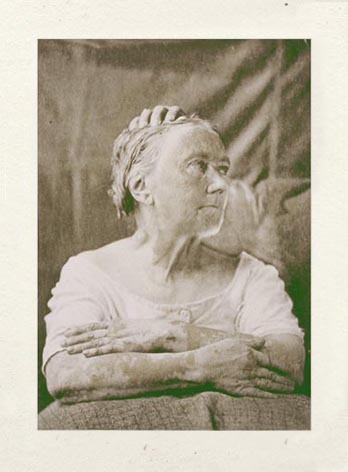
THE AFFECTION began two years ago, in the form of white spots on the hands. Has always been healthy, and is in good condition now. The skin of face, neck, and arms is, for the most part, of a decidedly darker hue than normal, looking as though tanned from out-door exposure. It is marked by irregular, sharply-defined, patches which, appear bleached, and are most noticeable on the nape of the neck, backs of hands, along the frontal border of the hair, on the lower eyelids, beneath the ears, and upon the arms. Patient thinks a brother was similarly affected.

I had no time for such silliness—
picture-making of my face and arms,
and for a book! I'm spotted, splotchy;
my brother was splotchy; lots of people are;
it runs in the family I kept telling them.
I've never been sick and I've worked
every day of my life. What a waste of time.
I should never agreed to come
to this hospital's photographic "studio"—
even the word sounds bad, lots more off-color
than my skin. I kept telling Mr. Mason I thought it
a waste of his paper and light. Finally
he said, "Mrs. B., please settle down
and stop talking and gesticulating so much."
"Gesticulating," I said, "Now just what
does gesticulating mean?" And he said,
"Please be still; just be still." Well now,
you can imagine how I took all that!
And so I told him exactly how I took all that.
He whispered something to his assistant,
a sickly-looking fellow, probably a patient,
who then came over and just grabbed my head
like it was a turnip, turned it and held it tight;
then click and that was it, the picture taken
and me with no time to compose myself.
I told Mr. Mason and his assistant
more than a thing or two when I left.
He just said, "Thank you, Mrs. B.;
you will make an excellent illustration."
Ha! I saw the picture later. I look like a fool.
Looks like a hand growing on my head.
Now I am fit for a medical book:
unfortunate, malformed woman
with finger-sprouting head. I didn't
even go back to complain to Mr. Mason.
I was, but there was always serious things to do—
canning or sewing or visiting those who really were sick,
and it would have been just another waste of time.
